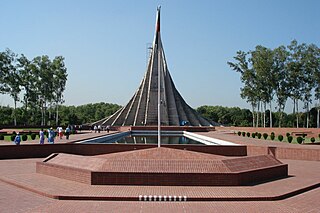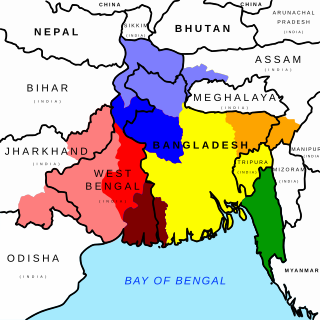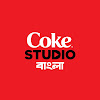
The Concert for Bangladesh was a pair of benefit concerts organised by former Beatles guitarist George Harrison and Indian sitar player Ravi Shankar. The shows were held at 2:30 and 8:00 pm on Sunday, 1 August 1971, at Madison Square Garden in New York City, to raise international awareness of, and fund relief for refugees from East Pakistan, following the Bangladesh Liberation War-related genocide and the 1970 Bhola cyclone. The concerts were followed by a bestselling live album, a boxed three-record set, and Apple Films' concert documentary, which opened in cinemas in the spring of 1972.
Bengali or Bengalee, or Bengalese may refer to:

"Amar Sonar Bangla" is the national anthem of Bangladesh. An ode to Mother Bengal, the lyrics were written by Bengali polymath Rabindranath Tagore, while the melody is derived from Baul singer Gagan Harkara's "Ami Kothay Pabo Tare", set to Dadra tala. The modern instrumental rendition was arranged by Bangladeshi musician Samar Das.

The Concert for Bangladesh is a live triple album credited to "George Harrison & Friends" and released on Apple Records in December 1971 in the United States and January 1972 in the United Kingdom. The album followed the two concerts of the same name, held on 1 August 1971 at New York's Madison Square Garden, featuring Harrison, Bob Dylan, Ravi Shankar, Ali Akbar Khan, Ringo Starr, Billy Preston, Leon Russell and Eric Clapton. The shows were a pioneering charity event, in aid of the displaced Bengali refugees of the Bangladesh Liberation War, and set the model for future multi-artist rock benefits such as Live Aid (1985) and the Concert for New York City (2001). The event brought Harrison and Starr together on a concert stage for the first time since 1966, when the Beatles retired from live performance, and represented Dylan's first major concert appearance in the U.S. in five years.

"Bangla Desh" is a song by English musician George Harrison. It was released as a non-album single in July 1971, to raise awareness for the millions of refugees from the country Bangladesh, formerly known as East Pakistan, following the 1970 Bhola cyclone and the outbreak of the Bangladesh Liberation War. Harrison's inspiration for the song came from his friend Ravi Shankar, an Indian-Bengali musician, who approached Harrison for help in trying to alleviate the suffering. "Bangla Desh" has been described as "one of the most cogent social statements in music history" and helped gain international support for Bangladeshi independence by establishing the name of the fledgling nation around the world. In 2005, United Nations Secretary-General Kofi Annan identified the song's success in personalising the Bangladesh crisis, through its emotive description of Shankar's request for help.
Desh TV, stylized as DESHTV, is a Bangladeshi Bengali-language satellite and cable television channel owned by Desh Television Limited, a part of the Karnaphuli Group conglomerate. It officially commenced broadcasts on 26 March 2009. Desh TV is headquartered in Malibagh, Dhaka. The channel is broadcast via the Bangabandhu-1 satellite.

There have been numerous works of art created as a result of the Bangladesh Liberation War. In 1971, a concert was organized by members of the British rock band, The Beatles, in support of Bangladesh. The songs recorded for and broadcast on Swadhin Bangla Betar Kendra are still considered to be the best of Bangladeshi protest songs.
Anusheh Anadil is a Bangladeshi musician, artist, cultural activist, and social entrepreneur. The band 'Bangla' was the first female lead band from Bangladesh that became iconically popular in both Bangladesh and West Bengal (India), for their first album Kingkortobbobimuro (2002). Their rendition of spiritual folk songs, along with their own original songs, became a revolution for bringing the sounds of the village bard into popular culture. They helped popularize the philosophy of Fakir Lalon Shai, as a breath of fresh air, to the urban youth. Bangla's second album Prottutponnomotitto (2005) is a tribute to Fakir Lalon Shai. The album questions religious extremism and corrupt politics by using songs of the insightful mystic. The band 'Bangla' inspired many young musicians from both sides of Bengal to rediscover their roots.

Zulfiqer Russell is a Bangladeshi lyricist and journalist. He is currently the editor of the online news site, The Bangla Tribune. He won the Bangladesh National Film Award for Best Lyrics for the film Putro (2018). He was the winner of the Channel i Music Awards in 2008, 2010, 2013 and 2022 and also received the Mirchi Music Awards (Bangla) award for the Song of the Year in the Modern Song category for, "Shabuj Chilo". On 2020 he was awarded CJFB Performance Award 2019 as best lyricist. He had also worked with renowned Indian singers and composers including Grammy and Academy Award (Oscar) winner musician A. R. Rahman. He wrote the official theme song 'Ektai Achhe Desh' of the Golden Jubilee of Bangladesh Independence sang by fifty renowned singers of Bangladesh.

"Deep Blue" is a song by English rock musician George Harrison that was released as the B-side to his 1971 charity single "Bangla Desh". Harrison wrote the song in 1970, midway through the recording sessions for All Things Must Pass, and recorded it in Los Angeles the following year while organising the Concert for Bangladesh. The composition was inspired by the deteriorating condition of his mother, Louise, before she succumbed to cancer in July 1970, and by Harrison's feelings of helplessness as he visited her in hospital in the north of England. Given the subject matter, "Deep Blue" also served to convey the suffering endured by the millions of refugees from war-torn Bangladesh in 1971, as sickness and disease became widespread among their makeshift camps in northern India.

Sohini Alam is a British singer of Bangladeshi descent who sings in the bands Khiyo, Lokkhi Terra, and GRRRL. She has performed internationally on stage, radio, and television and worked on music for dance, theatre, and film. Alam is a founding member of the arts company Komola Collective and co-music director of the documentary film Rising Silence. After providing vocals for dancer/choreographer Akram Khan's DESH, she spent three years touring internationally with his show Until the Lions.

The Concert for Bangladesh is a film directed by Saul Swimmer and released in 1972. The film documents the two benefit concerts that were organised by George Harrison and Ravi Shankar to raise funds for refugees of the Bangladesh Liberation War, and were held on Sunday, 1 August 1971 at Madison Square Garden in New York City. As well as notable performances from Harrison and Shankar, the film includes "main performer" contributions from Harrison's fellow ex-Beatle Ringo Starr, Billy Preston and Leon Russell, and a surprise walk-on from Bob Dylan. Other contributing musicians include Ali Akbar Khan, Eric Clapton, the band Badfinger, Klaus Voormann, Jesse Ed Davis, Jim Horn and Jim Keltner.

Joi Bangla is an EP by Indian sitar virtuoso Ravi Shankar, issued in August 1971 on Apple Records. The recording was produced by George Harrison and its release marked the first in a series of occasional collaborations between the two musicians that lasted until the Chants of India album in 1997. Shankar recorded the EP in Los Angeles, to help raise international awareness of the plight faced by refugees of the Bangladesh Liberation War, in advance of his and Harrison's Concert for Bangladesh shows at Madison Square Garden, New York. Side one of the disc consists of two vocal compositions sung in Bengali, of which the title track was a message of unity to the newly independent nation, formerly known as East Pakistan. The third selection is a duet by Shankar and sarodya Ali Akbar Khan, supported by Alla Rakha on tabla, a performance that presaged their opening set at the Concert for Bangladesh.

Bangladesh–Yemen relations are the bilateral relations between Bangladesh and Yemen. In 2014 Mohammad Ashab Uddin was named Bangladeshi ambassador to Yemen.
Rubayyat Jahan is a Bangladeshi-born British singer.

Bengal is a region in South Asia, politically split between Bangladesh and India. Due to its long history and complicated political divisions, various names have been used to refer to the region and its subsections. The name Bangla is used by both Bangladesh and West Bengal in international contexts. In the Bengali language, the two Bengals each use a different term to refer to the nominally identified nation: Bānglā and Baṅga

Coke Studio Bangla, also known as Coke Studio Bangladesh, is a Bangladeshi television series which is the local installment of the Coke Studio franchise, featuring studio-recorded music performances by established and emerging Bangladeshi artists with the goal of promoting Bangladeshi music.












